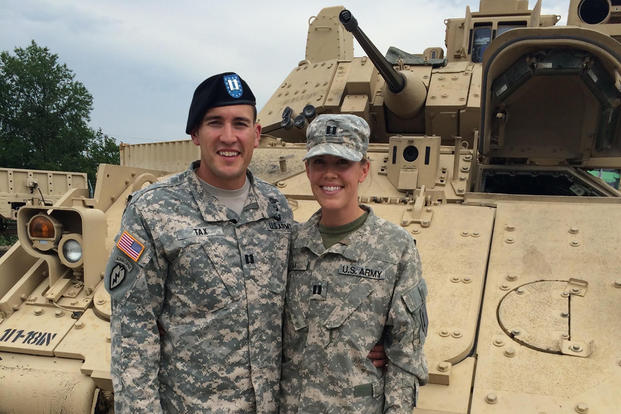Together, they spent 12 years in the U.S. Army. Michael Tax was a Ranger -- boots on the ground. Rachael was a Chinook pilot -- boots in the air.
Like most military couples, they were separated by training, duty stations and deployments. And if you're a military couple, you know too well the tremendous sacrifices military husbands and wives must endure.

"One of the most difficult decisions we made," said Michael, "was to leave the military for civilian life. We felt that the Army constituted much of what we know and how we lived."
Military service is about being a part of something bigger than yourself. It's also an incredibly mission-driven community. And so it's no wonder that when transitioning, there's a sense of loss -- loss of community and a loss of mission. For Michael and Rachael, this was also true. But they overcame this loss with grit, help from mentors, and lots and lots of mission planning.
One of the key principles to a successful transition is to utilize your military training and approach your transition like a mission.
Michael and Rachael had lots of things on their bucket list that they wanted to do before committing to going back to school and decided to take a gap year to travel and reconnect with each other and family and friends.

"We spent nearly 50% of our married life apart," Rachael said. "By taking 12 months to slowly travel together, and visit our relatives and friends along the way, we are rekindling relationships that we allowed to fade behind our busy Army lives."
Michael and Rachael's top tips for a successful military transition:
1. Have a Plan, Goal or Expectation for Yourself
It needs to be specific and measurable (and all the other traits of a goal). The military is really great about defining goals for you and then guiding you to achieve them (or remediating you if you don't), so you will know you are ready to leave when you can make a list of your own. The plan needs to be financed and thought-out. It doesn't hurt to have a mentor or someone to hold you accountable to that plan.
2. Make a Plan and Set Goals Before You Separate
If you are going to attend school, know which one and have an acceptance letter in hand before picking up your DD214. If you are going straight to work, the same rule applies. As a former company commander, I learned that this is where the chain of command should be extremely supportive and involved, if necessary. I personally could have been more empathetic toward the time and energy it takes to prepare the individual and their family for the transition.
3. Ask for Others' Opinions, Help, Ideas and Experiences
You are not obligated to follow their advice, and it doesn't hurt to ask. I am guilty of not doing this enough. In formulating our transition, we were in daily contact with those who had already made the move. While traveling, getting the advice of other travelers or locals is how we "stumble" into the best parts of our trips.
"As cliché as it is, you only live once," Michael said. "So if you have questions about extended, post-military travel, please don't hesitate to contact us. We're following our dreams and hope you do, too."
After their gap year, Michael plans on returning to school to get his MBA and Rachael intends to get her degree in alternative medicine.
The Next Step: Find the Right Job
Whether you want to polish up your resume, find veteran job fairs in your area, or connect with employers looking to hire veterans, Military.com can help. Sign up for a free Military.com membership to have job postings, guides and advice, and more delivered directly to your inbox.
















